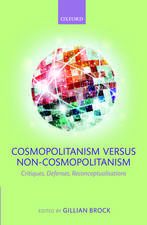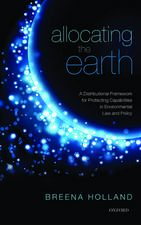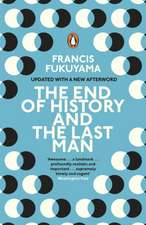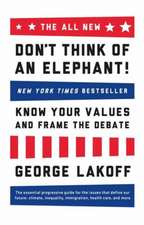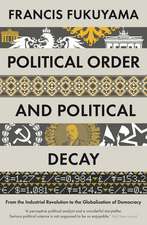Trust: Human Nature and the Reconstitution of Social Order
Autor Francis Fukuyamaen Limba Engleză Paperback – 31 mai 1996
Challenging orthodoxies of both the left and right, Fukuyama examines a wide range of national cultures in order to divine the underlying principles that foster social and economic prosperity. Insisting that we cannot divorce economic life from cultural life, he contends that in an era when social capital may be as important as physical capital, only those societies with a high degree of social trust will be able to create the flexible, large-scale business organizations that are needed to compete in the new global economy.
A brilliant study of the interconnectedness of economic life with cultural life, "Trust" is also an essential antidote to the increasing drift of American culture into extreme forms of individualism, which, if unchecked, will have dire consequences for the nation's economic health.
Preț: 119.84 lei
Nou
Puncte Express: 180
Preț estimativ în valută:
22.93€ • 23.86$ • 18.93£
22.93€ • 23.86$ • 18.93£
Carte disponibilă
Livrare economică 24 martie-07 aprilie
Preluare comenzi: 021 569.72.76
Specificații
ISBN-13: 9780684825250
ISBN-10: 0684825252
Pagini: 480
Dimensiuni: 158 x 238 x 30 mm
Greutate: 0.55 kg
Editura: Free Press
ISBN-10: 0684825252
Pagini: 480
Dimensiuni: 158 x 238 x 30 mm
Greutate: 0.55 kg
Editura: Free Press
Notă biografică
Francis Fukuyama is a Senior Fellow at the Freeman Spogli Institute for International Studies (FSI) at Stanford University, and Mosbacher DIrector of FSI's Center on Democracy, Development, and the Rule of Law. Dr. Fukuyama has written about questions concerning governance, democratization, and international political economy. His book The End of History and the Last Man has appeared in over twenty foreign editions. His most recent books are The Origins of Political Order: From Prehuman Times to the French Revolution, and Political Order and Political Decay: From the Industrial Revolution to the Globalization of Democracy.
Descriere
The bestselling author of The End of History explains the social principles of economic life in the mid-1990s. Francis Fukuyama shows why he believes only those societies with a high degree of social trust will be a ble to creat the organizations needed to compete in the new global economy.
Cuprins
CONTENTS
Preface
PART I
The Idea of Trust: The Improbable Power of Culture in the Making of Economic Society
1. On the Human Situation at the End of History
2. The Twenty Percent Solution
3. Scale and Trust
4. Languages of Good and Evil
5. The Social Virtues
6. The Art of Association Around the World
PART II
Low-Trust Societies and the Paradox of Family Values
7. Paths and Detours to Sociability
8. A Loose Tray of Sand
9. The "Buddenbrooks" Phenomenon
10. Italian Confucianism
11. Face-to-Face in France
12. Korea: The Chinese Company Within
PART III
High-Trust Societies and the Challenge of Sustaining Sociability
13. Friction-Free Economies
14. A Block of Granite
15. Sons and Strangers
16. Job of a Lifetime
17. The Money Clique
18. German Giants
19. Weber and Taylor
20. Trust in Teams
21. Insiders and Outsiders
22. The High-Trust Workplace
PART IV
American Society and the Crisis of Trust
23. Eagles Don't Flock -- or Do They?
24. Rugged Conformists
25. Blacks and Asians in America
26. The Vanishing Middle
PART V
Enriching Trust: Combining Traditional Culture and Modern Institutions in the Twenty-first Century
27. Late Developers
28. Returns to Scale
29. Many Miracles
30. After the End of Social Engineering
31. The Spiritualization of Economic Life
Notes
Bibliography
Index

